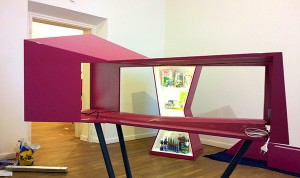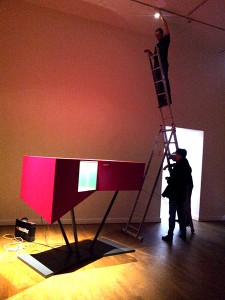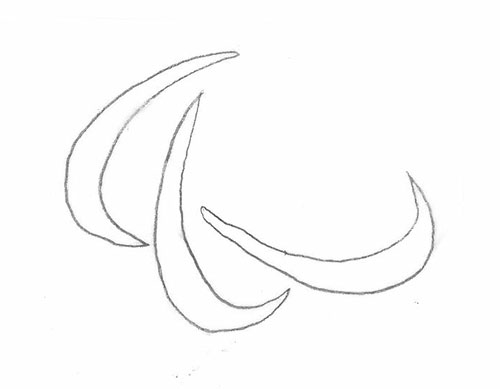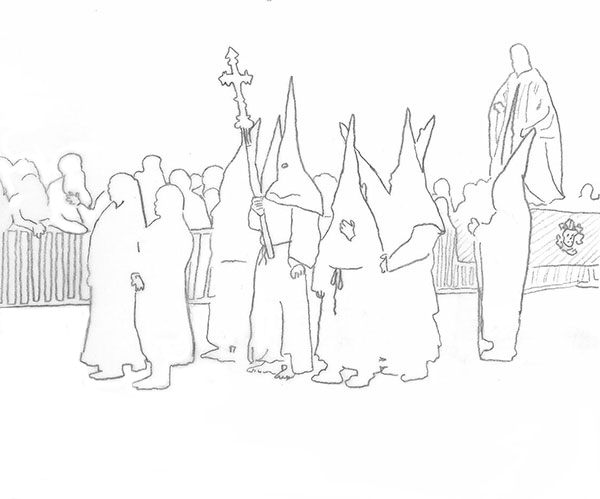
Installation of the showcases for the exhibition “The Whole Truth”
© Jewish Museum Berlin, photo: Michal Friedlander
The exhibition “The Whole Truth … everything you always wanted to know about Jews” opens in a few days. The curatorial team steps back to admire the showcases and compliment one another on a job well done.
Not quite. Let me guide you through my afternoon.
13:45 After returning our food trays in the Mensa, there is a rush for the freezer box containing ice cream. Avoiding the crush, I make for the candy stand. Deliberations. I confer with my colleagues. M & Ms, Toblerone and Rittersport. Wrappers are discarded before we have even left the room.

Installation of the showcases for the exhibition “The Whole Truth”
© Jewish Museum Berlin, photo: Michal Friedlander
14:00 I scroll through the 13 page document listing the questions asked by museum visitors. The questions relate to Jews, Judaism and the Jewish Museum Berlin. Many repetitions. The list needs to be tidied up for exhibition use. A few samples:
Why are there so many Jewish museums and who pays for it all?
Are Jews normal?
Do Jews have horns?
Why do Jews think they are so special?
Why don’t all Jews live in Israel?
Why didn’t Jews defend themselves against the Nazis?
…?
Time for another sugar inhalation. → continue reading
Employees of the Jewish Museum Berlin answer the question.
 “My public events of the year were the Olympic and the Paralympic Games in London. (An extra: black-striped cross-eyes the next morning.) There were incomparably more pictures of the Paralympics than ever before: the photos of people sprinting with artificial legs had a particular symbolic power for me: flying over hurdles!”
“My public events of the year were the Olympic and the Paralympic Games in London. (An extra: black-striped cross-eyes the next morning.) There were incomparably more pictures of the Paralympics than ever before: the photos of people sprinting with artificial legs had a particular symbolic power for me: flying over hurdles!”
Ines Rösler, Collections
(editor’s note: Our blog posting for the 31. August 2012 was dedicated to Ludwig Guttmann, father of the Paralympics.)
“For me the discussion about the bestowal of the Adorno Prize on Judith Butler was the event of the year, because the verbal chasm between Butler’s style of argumentation and the colloquial style of the critics who questioned her worthiness to receive the prize deeply dismayed me. A few meals with friends during those late summer weeks threatened to turn into evenings of heated discussion, with all the charm of a plenary assembly for ASTA.”
Mirjam Wenzel, Media
(editor’s note: Four days after the Adorno Prize event, on 15. September 2012, a long-planned panel discussion with Judith  Butler and Micha Brumlik discussed “Does Zionism Belong to Judaism?”)
Butler and Micha Brumlik discussed “Does Zionism Belong to Judaism?”)
“My event of 2012: the Good Friday procession in Perpignan with its bells and drums.”
Johannes Rinke, Visitor Services
The Gregorian calendar, according to which we are now counting the year 2013, begins on circumcisio domini, the day on which Jesus was circumcised. Last year, the act of circumcision was at the center of a political debate which discussed the relationship between non-Jewish Germans, German Jews and Muslims and Jews in Germany. The editors of the Jewish Museum’s website nominate the so-called circumcision debate as the event of the year 2012.
“One event of 2012 is still visible all over the city in 2013: The bancruptcy of the drugstore chain “Schlecker.” Empty store windows on every corner promising better quality of life in the neighborhood. But most will likely end up being storerooms for fitted kitchens.”
Martina Lüdicke, Exhibitions



